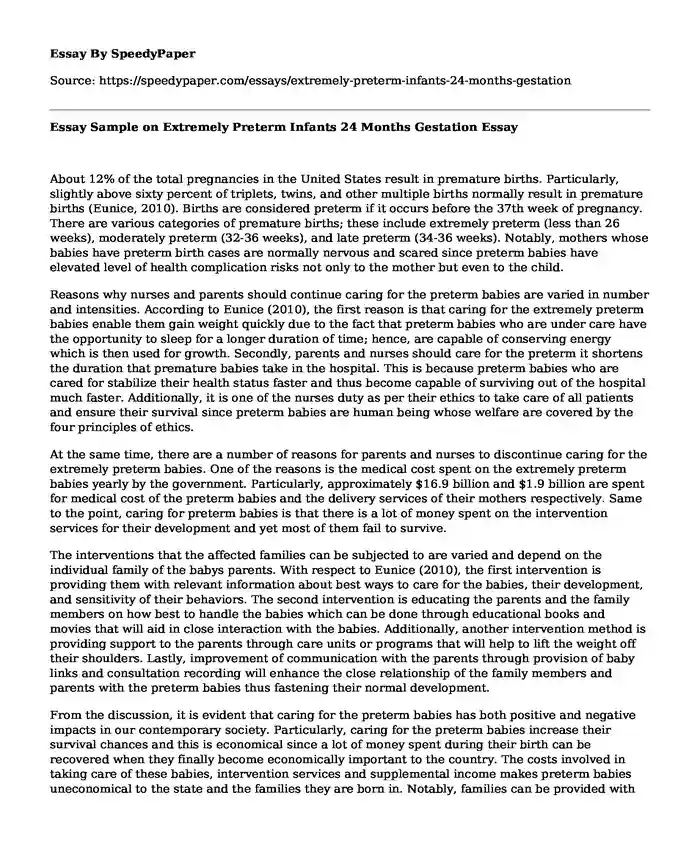
| Type of paper: | Essay |
| Categories: | Healthcare Pregnancy |
| Pages: | 3 |
| Wordcount: | 631 words |
About 12% of the total pregnancies in the United States result in premature births. Particularly, slightly above sixty percent of triplets, twins, and other multiple births normally result in premature births (Eunice, 2010). Births are considered preterm if it occurs before the 37th week of pregnancy. There are various categories of premature births; these include extremely preterm (less than 26 weeks), moderately preterm (32-36 weeks), and late preterm (34-36 weeks). Notably, mothers whose babies have preterm birth cases are normally nervous and scared since preterm babies have elevated level of health complication risks not only to the mother but even to the child.
Reasons why nurses and parents should continue caring for the preterm babies are varied in number and intensities. According to Eunice (2010), the first reason is that caring for the extremely preterm babies enable them gain weight quickly due to the fact that preterm babies who are under care have the opportunity to sleep for a longer duration of time; hence, are capable of conserving energy which is then used for growth. Secondly, parents and nurses should care for the preterm it shortens the duration that premature babies take in the hospital. This is because preterm babies who are cared for stabilize their health status faster and thus become capable of surviving out of the hospital much faster. Additionally, it is one of the nurses duty as per their ethics to take care of all patients and ensure their survival since preterm babies are human being whose welfare are covered by the four principles of ethics.
At the same time, there are a number of reasons for parents and nurses to discontinue caring for the extremely preterm babies. One of the reasons is the medical cost spent on the extremely preterm babies yearly by the government. Particularly, approximately $16.9 billion and $1.9 billion are spent for medical cost of the preterm babies and the delivery services of their mothers respectively. Same to the point, caring for preterm babies is that there is a lot of money spent on the intervention services for their development and yet most of them fail to survive.
The interventions that the affected families can be subjected to are varied and depend on the individual family of the babys parents. With respect to Eunice (2010), the first intervention is providing them with relevant information about best ways to care for the babies, their development, and sensitivity of their behaviors. The second intervention is educating the parents and the family members on how best to handle the babies which can be done through educational books and movies that will aid in close interaction with the babies. Additionally, another intervention method is providing support to the parents through care units or programs that will help to lift the weight off their shoulders. Lastly, improvement of communication with the parents through provision of baby links and consultation recording will enhance the close relationship of the family members and parents with the preterm babies thus fastening their normal development.
From the discussion, it is evident that caring for the preterm babies has both positive and negative impacts in our contemporary society. Particularly, caring for the preterm babies increase their survival chances and this is economical since a lot of money spent during their birth can be recovered when they finally become economically important to the country. The costs involved in taking care of these babies, intervention services and supplemental income makes preterm babies uneconomical to the state and the families they are born in. Notably, families can be provided with relevant information, support, and communication services to help them deal with preterm baby issues accordingly.
Reference
SUPPORT Study Group of the Eunice Kennedy Shriver NICHD Neonatal Research Network. (2010). Target ranges of oxygen saturation in extremely preterm infants. The New England journal of medicine, 362(21), 1959.
Cite this page
Essay Sample on Extremely Preterm Infants 24 Months Gestation. (2020, Apr 27). Retrieved from https://speedypaper.com/essays/extremely-preterm-infants-24-months-gestation
Request Removal
If you are the original author of this essay and no longer wish to have it published on the SpeedyPaper website, please click below to request its removal:
- Insanity Defense Essay, Free Example for Everyone
- Essay Sample on Personal and Medical History
- Articles Analysis Essay Sample on Aging Families
- Music Essay Sample on David Bowie and Glam Rock
- Free Essay on Biopsychosocial vs. Biomedical Model
- Essay Example on Film Studies: Spartacus
- Insights Across Issues: A Compilation of Essay Samples on COVID-19, Public Health, and More
Popular categories




